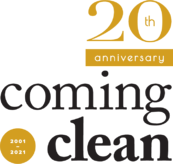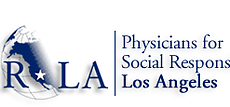September Spotlight: Physicians for Social Responsibility, Los Angeles
|
|
Physicians for Social Responsibility, Los Angeles (PSR-LA)Members: Martha Dina Argüello, Paula Torrado, Michael Rincon
|
|
|
About Physicians for Social Responsibility, Los AngelesPhysicians for Social Responsibility, Los Angeles (PSR-LA) advocates for policies and practices that improve public health, eliminate nuclear and environmental threats, and address health disparities. Current program areas include: nuclear threats, air & climate justice, land use & health, and toxics & water. |
Our work with the Coming Clean NetworkPSR-LA has been involved in Coming Clean since its founding and played a crucial role in helping to launch the Fence Line Action Work Group of Coming Clean. More recently they’ve been active in the Coming Clean network through their work with EJHA and the CHANGE coalition and have been active in the update process for the Louisville Charter. |
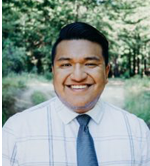
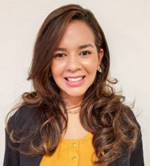
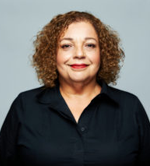
|
"One of the accomplishments that I'm most proud of is helping start the Fence Line Action Work Group of Coming Clean to create a space for environmental justice communities to have a conversation about toxics...We have to move upstream and change how products are produced, and change the culture so it’s not based on consumerism of things that are highly toxic. All of that was born from all the connections and relationships that we still hold."— Martha Dina Argüello |
Please introduce yourself and say a bit about what you were working on.
Martha: My name is Martha Dina Argüello. I'm the Executive Director of Physicians for Social Responsibility, and I've been here about 21 years. I have been really committed to bringing the idea of prevention and moving upstream in all of the work that we do, whether it's toxics, climate, water, nukes. We're working to achieve a healthier, more sustainable world, a regenerative economy, and to make sure that the health voice of physicians and health professionals are supporting community struggles and frontline communities.
Paula: My name is Paula Torrado, and I am the Air and Toxics Policy Analyst at PSR-LA. I'm also the Californians for a Healthy and Green Economy (or the CHANGE Coalition) Coordinator, which has been deeply involved with Coming Clean, the toxics work around the Louisville Charter, and bringing safer alternatives to fundamentally shift the way chemicals are managed, produced, and extracted in California.
Michael: My name is Michael Rincon, I also go by Mikey. I am the policy researcher at Physicians for Social Responsibility Los Angeles. I am also our water program lead. For our water program in particular, we've been working in communities of Southeast Los Angeles around the human right to water, making sure that community members have access to safe, clean, and affordable drinking water. However, there are a lot of obstacles that prevent community members from receiving that quality of water, even though California has some of the strictest standards and regulations around drinking water. We've also been working to find a way to address PFAS in drinking water. During a time when the state is currently going through a drought and water security is very limited, it's really important to make sure that we address water quality threats where possible, because based off of the way that things are going with the drought, we need to make sure that that water is healthy for every single community member.
What has it meant to be a member of the Coming Clean network? Are there any particular memories or accomplishments that you want to highlight?
Martha: I was at that very first meeting of Coming Clean in New Orleans (in 2001). So we did a lot of the pre-work: We did a screening of Trade Secrets, which was the show that a lot of the Coming Clean folks were organizing around. Many communities across the country organized viewing parties, and I organized one in LA at the local restaurant here.
Then I went to the first meeting. I'd been at PSR maybe a year and a half, not even two years, and it was my first national meeting, as we were expanding our work from pesticides to incorporate other toxics work. It meant a lot to me to have this national community of amazing advocates, mostly women: Some of the founding mothers, including Elizabeth Crowe, Kathy Curtis, Beverly Wright, Monica Harding, Judy Robinson, and all these folks that I'm still working with.
One of the accomplishments that I'm most proud of is helping start the Fence Line Action Work Group of Coming Clean to create a space for environmental justice communities to have a conversation about toxics. I think we helped in many ways to move away from some of the very narrowly defined consumer approaches. We can't just shop our way out of the problem; we actually have to move upstream and change how products are produced, change the culture so it’s not based on consumerism of things that are highly toxic. All of that was born from all the connections and relationships that we still hold.
What's also been really amazing is now that I've been at PSR for over years and our organization has grown, I've been able to introduce the next generation of toxics advocates that are working with PSR to this network. And they've been able to access those connections and relationships. So it's been a great place of mentorship and development for PSR as a whole.
Paula: I've been at PSR-LA for almost three years. I remember that meeting that we had in Louisville (in 2019) and we discussed deconstructing and going deep into what it meant to have safer alternatives and how often that term is co-opted. There’s the narrative that the chemical industry has, and we have to get out in front of that and speak directly to clean production and economic justice, led by the frontline voices driving the upstream movement that Martha was talking about. We also discussed eliminating the paralysis by analysis that the toxics advocacy has. That was really important for me to learn along with understanding the importance of the Louisville Charter in terms of prevention.
An accomplishment that I want to highlight is the webinar that we did in collaboration with EJHA that a lot of Coming Clean members attended last year on climate, toxics, and working towards decarbonizing, detoxifying, and democratizing the economy. There was a huge turnout and we could talk freely and in depth about the intersections of climate and toxics.
Michael: I'm a bit newer to the network; I’ve only been part of it for a few months now. But for me, someone who's a very big nerd around information, and data, and knowledge, since I've been part of the Coming Clean network, I have reached out to a couple of members here and there asking them about their perspective on a couple of questions that I may have. I've had a lot of interesting conversations and a lot of, “ohhhhh,” kind of moments. So I think just being able to access all of the experiences, all the stories in one group of people, has been very, very beneficial.
"PSR-LA brings the strength of not only a strong understanding of prevention, but also the credible voices of physicians to advocacy. It's so important to bring the connections of health and prevention to address climate change, toxic exposures, and localized exposures, while also uplifting the frontline voices in community decision-making and in policy decision-making"— Paula Torrado |
What do you feel like are the biggest opportunities right now to advance the kinds of change that you want to see?
Martha: We've been doing a lot of work around oil drilling and keeping fossil fuels in the ground. We know that if we don't keep them in the ground, they will end up either as transportation fuels, petrochemicals, or plastics. We are getting better at being able to work across those fields. So we have a campaign to end oil drilling in Los Angeles. We are now helping shape a coalition effort to bring EJ communities to work on plastics at different places in the fence line -- from the oil drilling site, to the refinery site, to the waste-to-energy site -- so that we're working from production to disposal and can advocate for more zero-waste policies and more policies that are actually transformative. I think we are starting to see real opportunities to bring those together.
Paula: PSR-LA brings the strength of not only a strong understanding of prevention, but also the credible voices of physicians to advocacy. It's so important to bring the connections of health and prevention to this climate of conversations to address climate change, toxic exposures, and localized exposures, while also uplifting the frontline voices in community decision-making and in policy decision-making, both to ensure that we avoid unintended consequences of policies and that environmental justice principles are at the center of policymaking. PSR-LA brings that force to the movement in addition to working directly with community-based organizations that bring frontline voices to the work.
Michael: When it comes to the opportunities that come up around water and toxics, with water there's always something going on; you’re literally putting out fires every single day. Last year it was the pandemic and making sure that people had access to safe drinking water and access to water because it's part of the prevention of further spread of COVID. This year, it's all around the focus of the drought and making sure that the water quality is up to date, because in past years even EPA allowed for lesser quality water to be served during drought years. I think we bring an interesting perspective and a connection that maybe some other folks may not have the opportunity or the capacity to really be involved in.
Thinking 20 years into the future, what do you hope will have changed? What do we need to keep in mind in order to secure that future?
Martha: That's a really tough question in the middle of the pandemic after the IPCC report, and the last couple of weeks of fighting off really bad false solutions to climate change. All this tells me that the balance of power is still not on our side. We've got a lot of organizing and power building to do, and I think Coming Clean allows us to do that at a national level. You've got researchers, you've got advocates, you've got NGOs, and then you've got really grassroots community-based organizations, fighting particular battles. I think that that structure is what we need to do it at a larger scale.
The oil industry and the chemical industry are finding ways to survive despite the fact that their products are killing people. They're very good at it, and they have a lot more resources than we do. While I might not be here in 20 years, what I would love to see is PSR still being a champion for environmental justice, and I would like to have some more wins under our belt. I joked at the Louisville meeting that we wanted to “Hulk smash” the chemical industry, but I think we do need to really disentangle the power of these industries in our politics, because they are literally choking us. I hope we build that kind of power because we don't have a lot of time to waste.
"During a time when the state is currently going through a drought and water security is very limited, it's really important to make sure that we address water quality threats where possible; because based off of the way that things are going with the drought, we need to make sure that that water is healthy for every single community member."— Michael Rincon |


